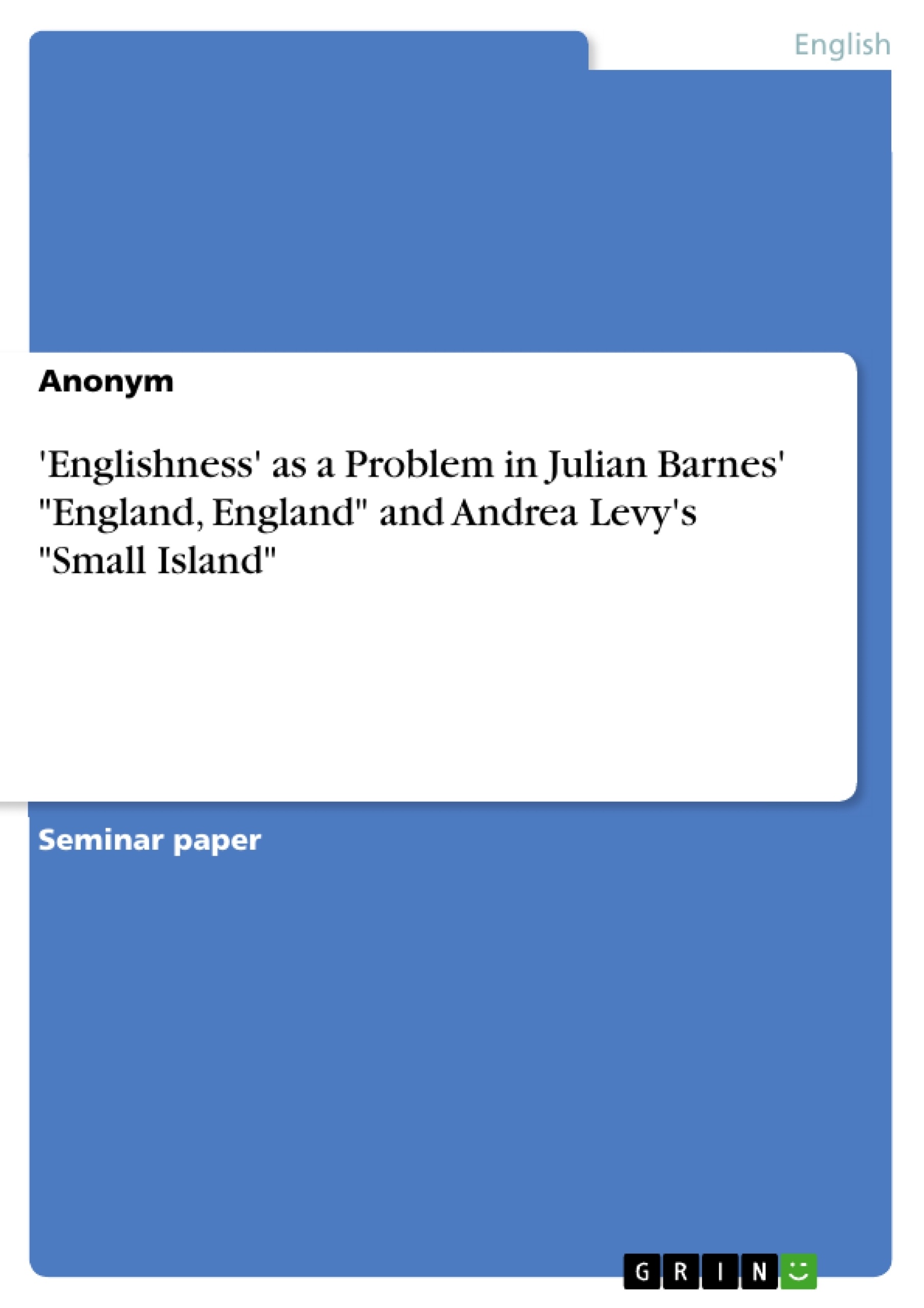What is ‘Englishness’ and how can it be distinguished from ‘Britishness’? Why do we need these national identity concepts and why do they pose a problem? The purpose of this essay is to discuss these questions by means of a careful analysis of two selected books: Julian Barnes’ England, England and Andrea Levy’s Small Island. While both novels deal with the concept of ‘Englishness’, they do so in different ways. While Barnes exposes the constructedness of collective identities like ‘Englishness’, Levy reveals its excluding function and the paradoxes between ‘Englishness’ and ‘Britishness’ from the perspectives of Jamaican ‘Windrush’-migrants.
Inhaltsverzeichnis (Table of Contents)
- Introduction
- 'Englishness' as a Problem
- 'Englishness' as a construct in Barnes' England, England
- 'Englishness' as an excluding concept in Levy's Small Island
- Conclusion
Zielsetzung und Themenschwerpunkte (Objectives and Key Themes)
This essay aims to explore the complexities of "Englishness" and its distinction from "Britishness," examining how these national identity concepts are constructed and the problems they pose. The analysis focuses on Julian Barnes' England, England and Andrea Levy's Small Island to illustrate these concepts.
- The constructed nature of national identity
- The role of history and memory in shaping identity
- The exclusionary aspects of national identity
- The commodification of national identity
- The search for belonging and community in the face of alienation
Zusammenfassung der Kapitel (Chapter Summaries)
Introduction: This introductory chapter establishes the central question of the essay: What is "Englishness," how does it differ from "Britishness," and why do these concepts present a problem? It sets the stage for the analysis of Julian Barnes' England, England and Andrea Levy's Small Island, highlighting their differing approaches to the concept of "Englishness." Barnes' work is positioned as exploring the constructed nature of identity, while Levy's focuses on its exclusionary aspects and the paradoxes between "Englishness" and "Britishness" from the perspective of Jamaican immigrants.
'Englishness' as a Problem: This chapter delves into the core argument, exploring "Englishness" as both a construct and an exclusionary concept through the lenses of the two novels. It lays the groundwork for a deeper examination of how each author presents and critiques the concept of national identity within their narrative. The chapter promises a comparative analysis of Barnes' satirical exploration of the constructed nature of collective identities and Levy's portrayal of the exclusionary function of "Englishness" within the context of the experiences of Jamaican immigrants.
'Englishness' as a construct in Barnes' England, England: This section analyzes Barnes' England, England as a postmodern satire and metafiction. It explores how Barnes deconstructs the notion of history as objective reality, instead portraying it as a cultural construct used to legitimize national identities. The chapter summarizes the novel's exploration of individual and collective identity construction, emphasizing how the artificial recreation of "Englishness" in the theme park satirizes the commodification of national identity and the manipulation of tourist expectations. It will also touch upon the problematic aspects of this commodification and the unintended consequences that arise from the artificial construction of a national identity.
Schlüsselwörter (Keywords)
Englishness, Britishness, national identity, collective identity, constructed identity, history, memory, cultural construct, postmodernism, satire, tourism, commodification, exclusion, immigration, identity construction, belonging, community, alienation, Julian Barnes, Andrea Levy, England, England, Small Island.
Frequently Asked Questions: A Comprehensive Language Preview
What is the overall topic of this language preview?
This preview provides a structured overview of an essay exploring the complexities of "Englishness" and its distinction from "Britishness." It analyzes how these national identity concepts are constructed and the problems they pose, using Julian Barnes' England, England and Andrea Levy's Small Island as case studies.
What are the key themes explored in the essay?
The essay investigates the constructed nature of national identity, the role of history and memory in shaping identity, the exclusionary aspects of national identity, the commodification of national identity, and the search for belonging and community in the face of alienation.
Which novels are analyzed in this essay?
The essay focuses on Julian Barnes' England, England and Andrea Levy's Small Island to illustrate different facets of "Englishness" and "Britishness."
How does the essay approach the concept of "Englishness"?
The essay examines "Englishness" as both a constructed concept and an exclusionary one. It explores how these concepts are presented and critiqued within the narratives of the two novels, comparing Barnes' satirical approach to Levy's focus on the experiences of Jamaican immigrants.
What is the methodology used in analyzing Barnes' England, England?
The essay analyzes Barnes' novel as a postmodern satire and metafiction, examining how it deconstructs the notion of objective history and portrays it as a cultural construct used to legitimize national identities. It explores the commodification of national identity and its consequences.
What is the focus of the analysis of Levy's Small Island?
The analysis of Levy's novel focuses on how "Englishness" functions as an exclusionary concept within the context of the experiences of Jamaican immigrants in post-war Britain, highlighting the paradoxes between "Englishness" and "Britishness."
What are the main chapters covered in the essay?
The essay includes an introduction, a chapter focusing on "Englishness" as a problem (analyzing both Barnes' and Levy's works), and a conclusion. A detailed section within the main chapter specifically examines Barnes' England, England.
What keywords are associated with this essay?
Key words include: Englishness, Britishness, national identity, collective identity, constructed identity, history, memory, cultural construct, postmodernism, satire, tourism, commodification, exclusion, immigration, identity construction, belonging, community, alienation, Julian Barnes, Andrea Levy, England, England, Small Island.
What is the purpose of this language preview?
This preview serves as a comprehensive guide to the essay's content, including its objectives, key themes, chapter summaries, and keywords. It is designed to provide a structured and professional overview for academic use.
- Quote paper
- Anonym (Author), 2013, 'Englishness' as a Problem in Julian Barnes' "England, England" and Andrea Levy's "Small Island", Munich, GRIN Verlag, https://www.grin.com/document/265564



